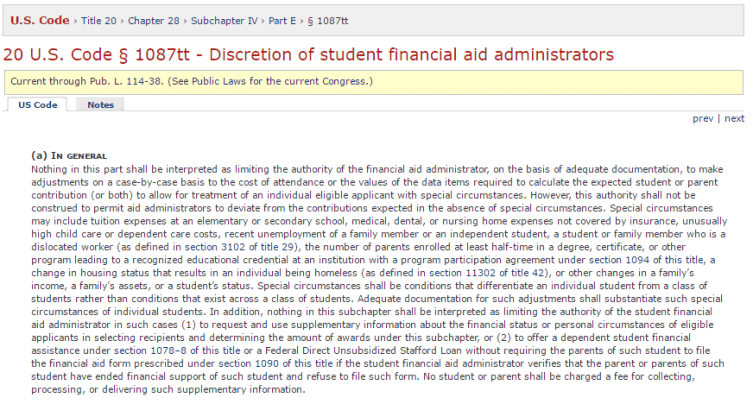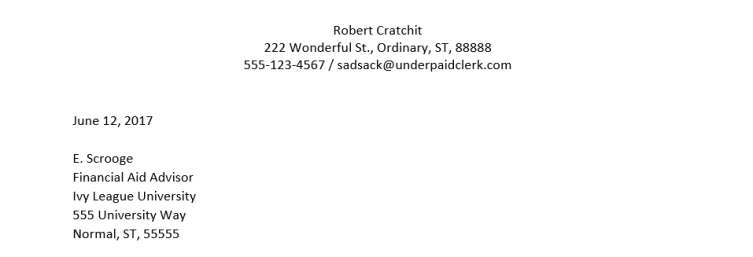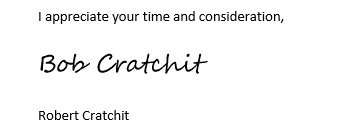How Long Does It Take My School to Process My Fafsa
The Complete Guide to Getting More Money
As FAFSA season rolls forward, we're committed to helping you navigate the complexities of getting the best financial aid package possible.
Here at College Choice, we're all about trying to demystify and simplify the processes of finding, getting into, paying for, and thriving in college.
In a recent post, we showed you how to work through the FAFSA app with no stress and get your max amount to pay for school.
So hop over there if you need advice on filling out the app quickly and efficiently—no fuss.
Here, we'll walk you through the FAFSA appeals process so you can have more money to pay for college, and we'll provide you with a form appeal letter to boot.
Say you've already applied and are disappointed with your financial aid package and feel you should be granted more funding based on your circumstances, or perhaps something significant has altered your financial situation recently.
These things aren't only demotivating, but they could be grounds for a financial aid appeal.
Ready? Buckle up and scroll… this guide will save you time, energy, and money.
What's the First Step to Appealing Financial Aid?
The first step to appealing your financial aid package is to determine whether or not you meet the "Special Circumstances" or "Unusual Circumstances" criteria to warrant a FAFSA appeal.
With FAFSA, you're dealing with bureaucracy, which means you will have to be tenacious and precise in asking for more money to pay for school.
To get more money for education, the recipient of the funds submits a formal appeal and letter explaining the appeal itself.
Below, we'll show you have to write that letter so that you can get the funding you deserve. Here, we'll explain the processes and circumstances that lead to appeals.
The process for appealing a FAFSA package is known as a special circumstances review or professional judgement review. These terms are often used interchangeably.
Your financial aid administrator has the authority to make changes and adjustments to the data elements of the FAFSA app or to the cost of attendance (COA) when Special Circumstances are the reason for appeal.
Here's what the law says:

And don't forget this little gem:

Yow… legalese! Let's cut to the chase; here's the portion granting your aid admin full authority:
![]()
Here's the portion containing the stipulations for Special and Unusual Circumstances:

Your financial aid administrator also has the authority to override the student's dependency status from dependent to independent when you've been effected by Unusual Circumstances.
Your admin has the power to determine this, and can act with authority if they determine the circumstance to be adequate:
![]()
All decisions made by the financial aid office are final. This means that no one can override the decisions or make changes to your FAFSA data—not the college/university president, the U.S. Department of Education, nor any other state agency.
And keep in mind, you cannot be discriminated against:
![]()
Now that you've had a look at the law (booorrriiinnnggg….), let's move on to the more pragmatic aspects of the appeal process. You don't need the legal language–you came for a boiled down blow-by-blow, so pay attention!
Remember, it's important that you get your appeal right the first time. Thousands of educational dollars could be riding on it!
What's the Difference Between Special Circumstances and Unusual Circumstances?
Special Circumstances pertain to issues that affect your financial status while Unusual Circumstances pertain to issues that affect your dependency status.
Special Circumstances include the following:
- The family is concerned that it will not be able to meet its required contribution
- The previous year's income was affected by a significant one-time event that aren't typical of the family's ability to meet its required contribution
- There are high unreimbursed medical/dental expenses not covered by the individual's insurance
- There are high dependent-care costs related to a special needs individual or elderly grandparent
- A parent loses a job or experiences a salary reduction
- A parent's income varies annually due to the volatility of their job
- A member of the family is seriously ill
- A parent dies, is incarcerated, becomes disabled, or is institutionalized
- Social Security benefits or child support ceases when the child reaches the age of majority
- The family suffers a natural or financial disaster
If you meet any of the above Special Circumstances, you have grounds for an appeal. While some of these circumstances are really specific, others have more wiggle room. If that doesn't quite fit your needs as you build your appeal, take a look at the following Unusual Circumstances, which include:
- There are PFAs (Protection from Abuse orders) against the student's parents or guardians
- Both of the student's parents are institutionalized or incarcerated
- The student is completely estranged from their family
- The student has been abandoned by their parents or guardians and is unable to locate them
- The student's parents are divorced, the custodial parent dies, and the student has no contact with or support from the non-custodial parent for an extended period
If you meet any of the above Unusual Circumstances, you have grounds for an appeal. Take note, these situations are very specific and pertain to your dependency status.
That said, be aware that the following criteria aren't grounds for an appeal. Here are some circumstances that, even when combined, are not adequate rationalization for dependency override:
- The student's parents refuse to complete the FAFSA or verification process
- The student demonstrates total self-sufficiency (including living on their own)
- The student's parents do not claim the student as a dependent on taxes
- The student's parents refuse to help pay for college education
Once you've made these determinations, you're ready to take the next step: requesting adjustments.
How Do I Get More FAFSA Money?
Requesting more FAFSA money can be broken down into two simple steps: contact your financial aid office and write a short summary of the special circumstances regarding your appeal, providing clear and professional documentation for your claim.
If you're disappointed with your FAFSA return, you must act immediately! Whether you're facing special financial circumstances or an ongoing crisis, the need to act ASAP can't be understated.
The sooner you act, the more likely your appeal will receive positive consideration because there are limited funds available for appeals. And don't forget, your appeal must be reconsidered each time you submit your FAFSA to be sure that your specific accommodations are still affecting your academic progress and financial situation.
Keep in mind that your financial aid admin is far more likely to grant you an appeal if the circumstances are beyond your control and your ability to pay for school.
Financial aid admins are not concerned with your choices or willingness to pay for school, so you will have to make a case that your circumstances are inevitabilities preventing you for progress rather than poor choices keeping you from what you want.
For a successful appeal, remember the following simple rules:
- Always be honest and courteous to the people you interact with
- Submit requests in multiple ways—in writing and digitally—so they are not lost in the bureaucracy of administrative university tasks
- Follow up and check in with your advisor ever couple weeks to signal that you're attentive and eager to complete the process
Do this, and you're one step closer to getting the appeal you deserve.
Step 1: Contact Your Financial Aid Office
If you would like to appeal your financial aid offering, your first step is to make contact, in person, with your college's financial aid office. Upon your visit, be sure to bring a pen, paper, a folder, and dress professionally.
If your circumstances preclude you from showing up in person, make that clear to the office and they will provide you with what you need via email. Don't forget to be courteous and kind—these are folks who will be helping to make a decision about your appeal.
In your meeting, ask these simple questions:
- What special forms and procedures do I need to follow when I appeal?
- What are the relevant dates needed to process my appeal efficiently?
- What documentation needs to be provided to the office of financial aid?
Your financial aid advisor will provide you with clear answers to these questions, and perhaps give you forms, documents, and other university-specific papers you will need to keep track of. Place any documentation in your folder for later examination.
Step 2: Write Your Appeal and Attach Documentation
Here comes the tricky and time consuming part: writing the document that you will submit to receive the appeal. Don't forget the following when writing this very important letter:
1. Pay attention to grammar, usage, and mechanics
Your letter should be professionally written. Be sure to double-check your letter for any writing mistakes. Pay attention to your tone, keeping it hospitable and accommodating; an air of humility should permeate the letter.
2. Your letter should be no more than one page
In your letter, be sure to communicate your circumstances clearly and effectively. This means you will need to
be succinct and formal. Pay attention to necessary and relevant details only, leaving out things that do not formally support your appeal request.
3. Provide specifics regarding your situation
You letter shouldn't be a vague outline of your life perils—it should be a specific document with concise information, including dates and amounts of money, about the changes in your circumstances that will affect your ability to continue your education.
For example, if you have lost your job, indicate exactly how much this will affect your ability to pay for school ("My income has decreased by $3,200 since my last tax return").
Or, if your parent has fallen ill or has become disabled, indicate how much time you suspect your parent will suffer with this condition ("My father, who will be paying for my education, was diagnosed with cancer last month and will be completing chemotherapy over the next 6 months. During this time, he will be unable to work to provide for our family.")
Most importantly, avoid being vague at all costs.
4. Provide exact conditions and personal information
Your letter should describe your circumstances specifically. Remember, you should have a counselor, physician, clergy person, lawyer, or health and wellness advocacy personnel help you with this aspect of your letter. Specialists will be able to provide you with specific language to explain your circumstance.
Be sure that any professionals advocating for you provide their name, title, credentials, and contact information in case the individual assigned to your appeal has a question.
These professionals should also supply you with signed, formal documentation pertaining to your appeal.
How Do I Write an Appeal Letter?
There are five main parts to an appeal letter: the introduction, the explanation, the declaration of commitment, the presentation, and the closing.
If you want a form letter, go ahead and click here to download one—all proofed and nearly ready to go, just plug and chug your info in.
If you want to make your own, take a look at the tutorial below. By the time you're done, this is what the thing should look like:

First thing's first: Get the format and names right.
The top of the document should have all your relevant contact information. Simple. Next, you'll have to format the top of the letter to look professional and concise:

Take note that this portion includes a date, the name, title, and contact information of the recipient of the letter.
Next, you'll move to the formal salutation. Think of the paragraph as a handshake with a generalized explanation of your appeal.
Next, right to it! Your introductory paragraph should look something like the following:
 Take a look at the simplicity: an inviting greeting after a business-like opening, a declaration of identity, and a professional, courteous statement of appreciation.
Take a look at the simplicity: an inviting greeting after a business-like opening, a declaration of identity, and a professional, courteous statement of appreciation.
After that, the circumstances are briefly explained. This sentence is, in fact, a transition sentence to the explanation paragraph:
![]()
Then, the explanation:

See how this paragraph includes specifics like dates and figures? Your paragraph should do this as well.
Financial aid folks like hard numbers:

Next, take a look at the fact that the person asking for the appeal is offering what he can, which is very enticing to a financial aid advisor:
![]()
And then an explicit request:
![]()
Next, you'll want to prove how committed you are to finishing school in the third paragraph:

You should go ahead and state that commitment outright in the third paragraph, which is—you guessed it—a declaration of commitment:

Then, you move right into the presentation of the evidence upon which you're basing your appeal:

In this case, it's a termination notice from a professional human resources department, but could be a letter from a counselor, lawyer, clergy person, physician, or other legitimate professional:

The document referenced here would be enclosed with the formal letter, contain the contact information of the professional as well as an official signature and credentials.
You will enclose a copy of this document in the envelope along with the letter.
Be sure to retain the original for yourself.
Next, you'll move to the closing paragraph where you remind them of your appeal and that you're availing yourself to the process:

Then, a kind sign-off and a signature:

And that's it! You're done! Drop that appeal in the mail with confidence, know that you've demonstrated your need articulately!
Again, don't hesitate to use our form appeals letter here, which can be downloaded here for free.
Online College Resources

Most Affordable Online Law Schools
December 8, 2021 | CollegeChoice.net Staff
A law degree can increase earning potential and career opportunities. Here, we list the best online programs available.

Best Online Colleges and Universities
December 3, 2021 | Staff Writers
According to the , 7,313,623 students enrolled in at least one distance education course at degree-granting postsecondary institutions in fall 2019. The year 2021 is an ideal time to pursue...
How Long Does It Take My School to Process My Fafsa
Source: https://www.collegechoice.net/choosing-a-college/finances/fafsa-appeal/
0 Response to "How Long Does It Take My School to Process My Fafsa"
Postar um comentário